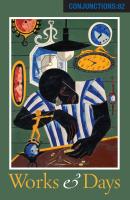![[A Reading by Robert Olen Butler]](http://www.conjunctions.com/images/event_image.php?id=131923) On Monday, March 13, at 2:30 p.m. in Weis Cinema, Robert Olen Butler reads from his new novel, Perfume River, the sequel to his Pulitzer Prize–winning fiction collection A Good Scent from a Strange Mountain. Sponsored by the Innovative Contemporary Fiction Reading Series, introduced by Bradford Morrow, and followed by a Q&A, this event is free and open to the public; no tickets or reservations are required.
On Monday, March 13, at 2:30 p.m. in Weis Cinema, Robert Olen Butler reads from his new novel, Perfume River, the sequel to his Pulitzer Prize–winning fiction collection A Good Scent from a Strange Mountain. Sponsored by the Innovative Contemporary Fiction Reading Series, introduced by Bradford Morrow, and followed by a Q&A, this event is free and open to the public; no tickets or reservations are required.Butler is the author of sixteen novels, including Mr. Spaceman and Hell, and six fiction collections, including Tabloid Dreams. His stories have appeared widely in such periodicals as Conjunctions, The New Yorker, Esquire, Harper’s, The Atlantic Monthly, GQ, The Paris Review, VQR, and Granta; as well as in four annual editions of The Best American Short Stories, eight annual editions of New Stories from the South, and elsewhere.
PRAISE FOR PERFUME RIVER
“What I so like about Perfume River is its plainly-put elegance. Enough time has passed since Viet Nam that its grave human lessons and heartbreaks can be—with a measure of genius—almost simply stated. Butler’s novel is a model for this heartbreaking simplicity and grace.” —Richard Ford“Butler’s Faulknerian shuttling back and forth across the decades has less to do with literary pyrotechnics than with cutting to the chase. Perfume River hits its marks with a high-stakes intensity. Butler’s prose is fluid, and his handling of his many time-shifts as lucid as it is urgent. His descriptive gifts don’t extend just to his characters’ traits or their Florida and New Orleans settings, but to the history he’s addressing.”—New York Times Book Review
“A deeply meditative reflection on aging and love, as seen through the prism of one family quietly torn asunder by the lingering effects of the Vietnam War. This is thoughtful, introspective fiction of the highest caliber, but it carries a definite edge, thanks to an insistent backbeat that generates suspense with the subtlest of brushstrokes.” —Booklist (starred review)
Any supporter who donates $500 or more to Bard’s literary journal Conjunctions receives a BackPage Pass providing VIP access to any Spring/Fall 2017 or future event in the Innovative Contemporary Fiction Reading Series. Have lunch with a visiting author, attend a seminar on their work, and receive premium seating at their reading. Or you can give your BackPage Pass to a lover of literature on your gift list! To find out more, click here or contact Micaela Morrissette at [email protected] or (845) 758-7054.
